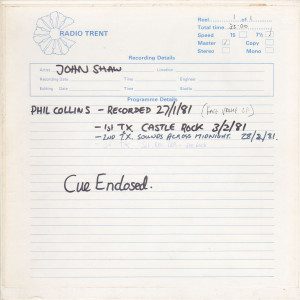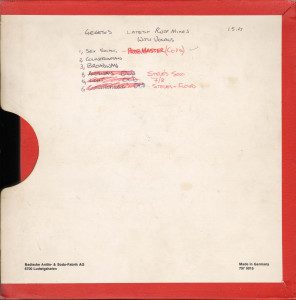The early 21st century has been witness to numerous projects that document and interpret popular music histories. Whether dedicated to regional histories, such as the Manchester District Music Archive and Birmingham Music Archive, or genre specific, like the National Jazz archive or the English Folk Dance and Song Society's 'Full English', digitsation has helped curators organise and publish material in new and exciting ways.

A significant amount of archive material that exists on the web has been collected by dedicated amateurs, and a recent transfer in the Greatbear studio is an example of such endeavour.
The Genesis archive is powered by the passion of Mark Kenyon who spearheads a small team of Genesis enthusiasts. Together they have created a detailed, unofficial fan-resource dedicated to one of England's most successful rock bands, and the solo careers of its members.
The Genesis archive is not the only fan site dedicated to Genesis, a band that commands serious adoration from their followers.
Mark's site is unique, however, for its focus on artifacts, and his drive to share a range of ephemeral and well known material with other fans across the world.
The site is 'constantly expanding', and the aim is to continue 'adding and improving the site like a giant wiki.' As well as receiving donations of material from fans of the group, Mark buys many of the items featured on the website and he always welcomes paypal donations to fund the quest for more archival material.
Mark told me he had 'various headaches' with website design, before he settled on a template that would allow him to showcase the wide range of material he has collected, and continues to collect.
Of particular note is the timeline function, which enables the user to browse each subsection of the site chronologically. This helps break down the content into digestible bits, while presenting items in a manner that is visually appealing.
The transfers
Mark contacted Greatbear because he had acquired two open reel tapes of rare Genesis-related material. Both tapes were in perfect playable condition and are the first reel to reel tapes to grace the Genesis archive.
The first reel was an interview between John Shaw, who died in 2013 , and Phil Collins, recorded on Radio Trent on 27th January 1981. This interview captures Collins as his debut album, Face Value, is climbing the charts.
Mark acquired the tapes for a reasonable price from ebay, after a friend of Shaw had put them up for auction early this year.
The Lamb Lies Down on Broadway recordings
The second reel we transferred was picked up at a Flea Market in Brick Lane, London, in the early 1980s. It contains semi-finished versions of Genesis's iconic 1974 album, The Lamb Lies Down on Broadway.
The material on the tape demonstrate how Genesis used recording technology to write an album that commentators claim was fraught with difficulty because of financial pressures from their record label, Charisma, and the creative tensions between Gabriel and the rest of the band.
The tape includes guide and out of tune vocals, different time signatures and guitars are placed high in the mix. Michael, who helps Mark to run the archive, ran an A/B comparison with the original vinyl version. He found that vocals ran ahead or were missing in places, and Phil Collins' drum fills differed significantly to the finished versions.
The lack of vocals can perhaps be explained by Kevin Holm-Hudson's claim that Gabriel was 'still writing and revising lyrics a month after the backing tracks had been finished'.

There is also a discrepancy between the titles written on the box and the material on the transferred tape which includes the following songs: 'Counting Out Time', 'The Supernatural Anesthetist', 'Back In NYC', 'Hairless Heart (Instrumental)'.
Mark cannot be 100% certain about the origin of the tape. It is equally likely they are from sessions recorded at the farm in Glaspant Wales, where Genesis used the Island mobile studio to record material for the album, or from sessions at Island studios in Basin Street, London. He has, however, seen photographic evidence of the sessions which indicate that around 10-15 tapes similar tapes were recorded.
Many of these tapes, of course, ended up in a skip once the final version had been 'laid down.' These tapes were never destined to be 'the final copy' of The Lamb Lies Down on Broadway. They may even be a source of embarrassment for the artists because they document their raw, unfinished moments of music making. Nonetheless, such tapes provide a fascinating insight into how 'classic' albums are recorded and written. For fans such recordings are gold dust. They help them to get closer to the moments when a magical piece of music was invented, or present evidence that it could have sounded very different.
The tapes also make clear that the recording itself can function as an instrument, integral to—rather than a one-dimensional document of—the writing process. Holm-Hudson wrote that 'occasionally, Gabriel would record over vocals over passages that some band members...thought would be instrumental.' Gabriel was using the recording, in other words, as a platform for vocal creativity, often against the creative vision of other band members.
It is no doubt that the Genesis archive will continue to evolve and grow in the future. The site Mark and his team have created is a resource for Genesis obsessives and popular music archivists.
It also more than that: an open, public site where visitors can learn about a range of popular music histories that intersect with the Genesis story. These include progressive rock and the concept album, 'World Music', the changing nature of both the music industry and its aesthetic expressions from the 60s-90s, to name a few examples.
***
Many thanks to Mark for discussing his archival work with us.

